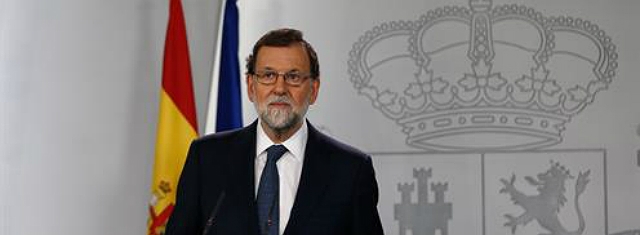Politics
The annus horribilis of Spain ends
2017 ends without resolving the crisis

Spanish Prime Minister Mariano Rajoy
USPA NEWS -
It was Queen Elizabeth II of England who, in 1992, described as "annus horribilis" the twelve months in which the British Monarchy lived its most difficult moments until that date with divorces, couple crises and criticism of real expenses, which led to at its lowest level of popularity. Today it is Spain that ends its "annus horribilis" of politics, but 2017 ends without resolving the serious institutional crisis created by the secessionist attempt of Catalonia.
The year that ends will go down in the history of Spain as the year of the unilateral independence of Catalonia, which has dragged all the political parties into a crisis of identity and popularity unknown to date. In the case of the conservative Popular Party, which supports the Government of Prime Minister Mariano Rajoy, he has seen how an almost newcomer to politics, the Citizens centrist party, has stolen tens of thousands of votes and has relegated him to the last place between the formations with representation in the Parliament of Catalonia, very close to the political irrelevance in that region. Something unacceptable for a political party with presence throughout the State and that aspires to be the constitutional reference in Spain.
Prime Minister Rajoy is criticized for his inaction in the face of problems. Rajoy is a politician with a lot of patience, who flees from confrontation and prefers to wait for his enemies to make mistakes and self-destruct. However, in the Catalan crisis acted applying the Article 155 of the Spanish Constitution, which provides for institutional control of rebel regions. And this measure is what has opened a breach within the Government and the Popular Party. Members of the Executive and of the conservative formation criticize that the solution of the Catalan crisis has relied on 155 because, with this, it has not been possible to deactivate the independence movement in Catalonia.
The independence movement has lost popular support and seats in Parliament, although, if the secessionist forces unite, they will achieve a sufficient majority to govern. But the independentist parties wage their own internal war. The nationalist Junts per Catalunya (Together for Catalonia), whose leader and former Catalan president, Carles Puigdemont, is on the run in Belgium, wants Puigdemont to be president, even if he has to govern from a distance. A possibility that rejects the Republican left ERC, whose leader is in jail. ERC prefers that its candidate, Oriol Junqueras, be president, and threatens to break the negotiations. Meanwhile, the third party in contention, the anti-system coalition CUP, demands the declaration of independence and the break with Spain to support the other indepedentist formations.
The Catalan political crisis has also dragged other parties. The leftist Podemos (We Can), who broke into Spanish politics as a champion of honesty, cleanliness and democracy, has been discovered as a dictatorial formation that has failed to find a unified and coherent discourse in the face of the independence threat. In the elections of December 21, he lost tens of thousands of votes and half of his seats, and faces the year 2018 as a crucial period for his future.
And the winner of the Catalan elections on December 21? The Citizens centrist party is not free either. It is the only Spanish political party suspended by the Spanish Court of Audit. Under suspicion for its financing, he faces this setback at the time he is considering opting for the Presidency of the Spanish Government in the next national elections. It is not easy because, in the whole of Spain, the conservative Popular Party is a strong and majority party. In addition, the leader of Citizens, Albert Rivera, must not only compete with Prime Minister Rajoy but also with the general secretary of the Socialist Party, Pedro Sanchez, who has managed to clean up his image and position himself as an alternative government.
Liability for this article lies with the author, who also holds the copyright. Editorial content from USPA may be quoted on other websites as long as the quote comprises no more than 5% of the entire text, is marked as such and the source is named (via hyperlink).





